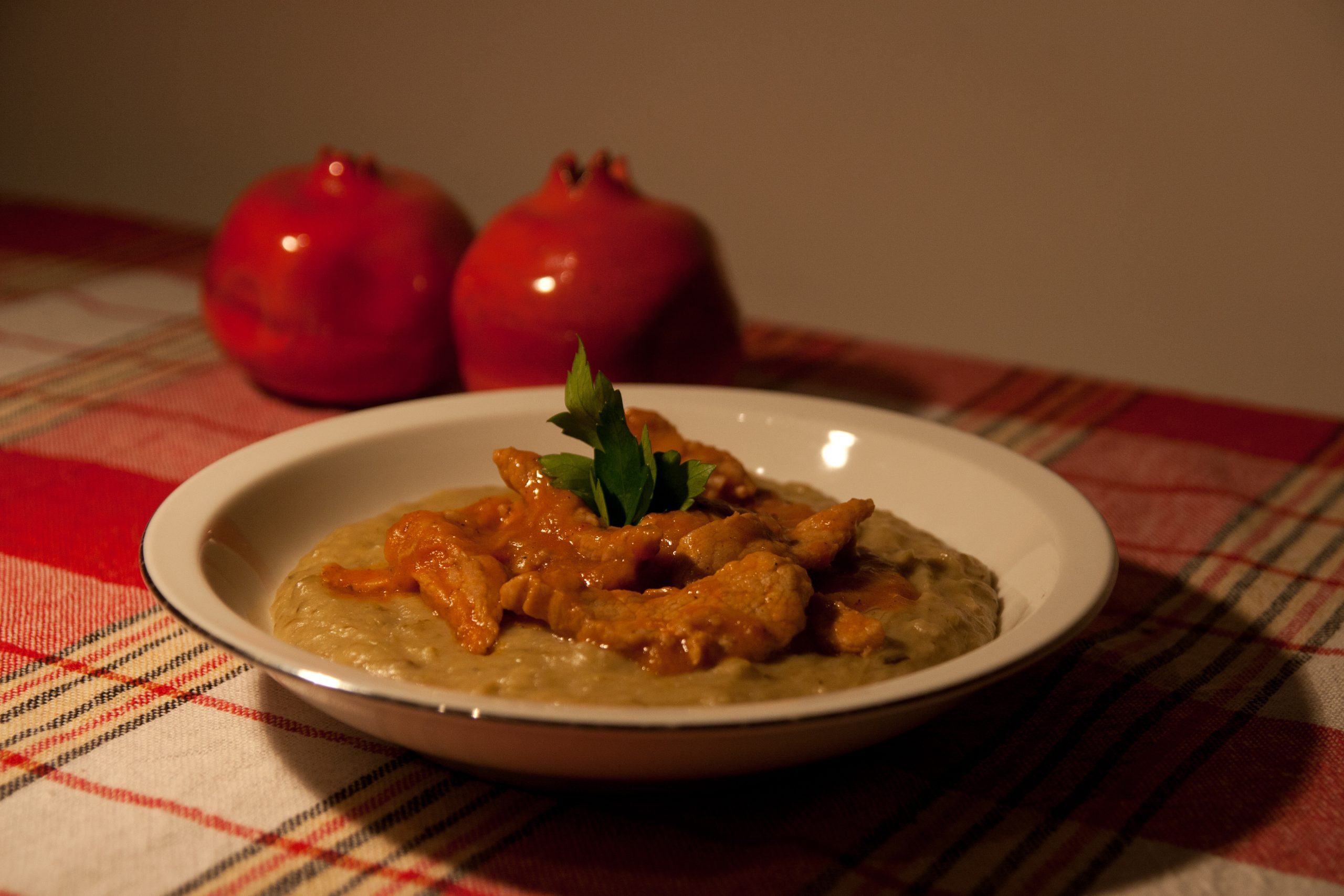Literally meaning, ‘the sultan liked it’, hunkar begendi is one of the most refined dishes in Turkish cuisine. The invention of this festive dish dates back to 19th century, to the times of Sultan Abdulaziz, who was a gourmet Ottoman ruler.
Once upon a time, French emperor Napoleon visited Sultan Abdulaziz in Istanbul, together with his wife Eugenie, when they were on the way to the opening ceremony of Suez Canal. Eugenie was known to be a picky eater. She was always traveling together with her talented French cooks. One of her chefs accompanied the couple to Istanbul and joined the Topkapi palace kitchen crew during their stay.
One day, while roasting eggplants, the Ottoman chef saw the French chef preparing his famous béchamel sauce for Eugenie. He offered to mix the roasted eggplants with this thick white sauce that he saw for the first time. Chefs served this creamy invention for dinner, together with a stew of game animals hunted by Abdulaziz and Napoleon earlier that day. The Sultan appreciated this new dish very much and gave inspiration to its name. Rumor has it that, following this incident, a flawless hunkar begendi performance was demanded of every cook who wanted to work in the palace.
Although it can now be described simply as ‘braised lamb over silky eggplant puree’, hunkar begendi owns the title of being the most civilized dish in the Ottoman cuisine. Not only because the recipe involves advanced cooking techniques for the time it was invented, but also because it represents one of the first examples of fusion in the Ottoman cuisine, which was famous for being very conservative.
In modern Turkey, hunkar begendi is not an ordinary dish that mothers regularly serve for dinner, but it can be found in every traditional meat restaurant. Maybe its royal background makes this dish seem too fancy for a student meal, but after trying it once you will see that you can prepare the favorite dish of Sultan Abdulaziz in a very short time and with just a few basic ingredients. Here is a recipe for four.
Ingredients
For the sauce:
-
3-4 eggplants -
5 tablespoons of flour -
1 cup of milk -
2 tablespoons of butter -
salt
For the meat:
-
500 grams of meat (lamb or veal) -
3 onions -
2 tablespoons of tomato puree -
2 cups of warm water -
3 tablespoons of sunflower oil -
salt and pepper
Preparation:
Roast the eggplants for 40 minutes with the grill of your oven, rotating the eggplants a quarter every 10 minutes. If you do not have such a grill you can wrap the eggplants in aluminum foil and roast them on your stove as well. While the eggplants are getting ready, you can start preparing the meat segment.
Heat the oil in a pan; brown the onions that you cut in very thin long slices. Cut the meat of your choice in small pieces and stir together with the onions until they change color. Add your tomato puree, warm water, salt and pepper to this mixture and stir until the water boils. Now you can set the fire to minimum, put a lid on your pan and let it slowly cook for at least 20 minutes.
When the eggplants are ready, peel their skin off quickly and mash them lengthwise in a bowl before they cool down. Melt the butter in a saucepan and add the flour while stirring continuously. When the flour gets creamy in the butter you can add the eggplants and stir fast. Pour the milk in the pan slowly and keep stirring. The sauce will quickly get thicker and you can take it off the stove when it reaches the consistency of potato mash. Hunkar begendi is served with the meat stew on top of the eggplant puree, as shown in photo. Afiyet olsun!
De Britse uitgeverij Quercus Books is met een opmerkelijke reeks boekjes gekomen over Grote Vragen in natuurkunde, filosofie, astronomie en wiskunde. Het concept is even helder als eenvoudig: formuleer twintig vragen over de meest fundamentele en brandende vragen op het vakgebied en laat een wetenschapper met talent voor popularisering over elk van die vragen een verklarend essay schrijven van drieduizend woorden. De reeks staat onder redacteurschap van filosofieprofessor Simon Blackburn van de universiteit van Cambridge. In Nederland heeft Veen Magazines nu het eerste deel van de reeks, dat over natuurkunde, in een vertaling uitgebracht. De uitvoering als een moleskin notebook met een elastiekje om de kaft is daarbij gehandhaafd.
Het natuurkundeboek is geschreven door quantumfysicus Michael Brooks die zijn universiteitsbaan in Cambridge combineert met redactiewerk voor onder meer New Scientist. In het boek schrijft hij losjes (de vertaling is soepel) en vanuit een helikopterperspectief over de natuurkunde.
Het gaat over zaken als zwaartekracht, relativiteit, het raadsel van massa, quarks, antimaterie, snaartheorie en de unificatie van de natuurkrachten. Bij popularisering daarvan ligt zweverigheid op de loer. Zeker als het over parallelle werelden gaat en over de vraag naar wat er voor de oerknal is geweest. Brooks weet die vaagheid te vermijden. Als er geen eenduidig antwoord is, maar in plaats daarvan een veelheid aan hypotheses, dan geeft hij die ook.
Er is wel geschreven dat de inhoud te licht zou zijn voor (natuurkunde) studenten. Ik betwijfel dat. Natuurlijk is dit geen tentamenstof, maar het boek biedt wel een snel en helder overzicht over de natuurkunde in de breedte. En daar komt een universiteit met alle specialismen nauwelijks aan toe.
Michael Brooks, De Grote Vragen – Natuurkunde, Veen Magazines, 208 pagina’s, 20 euro. Amazon UK biedt drie delen van de serie aan voor 21 pond (22 euro)



Comments are closed.